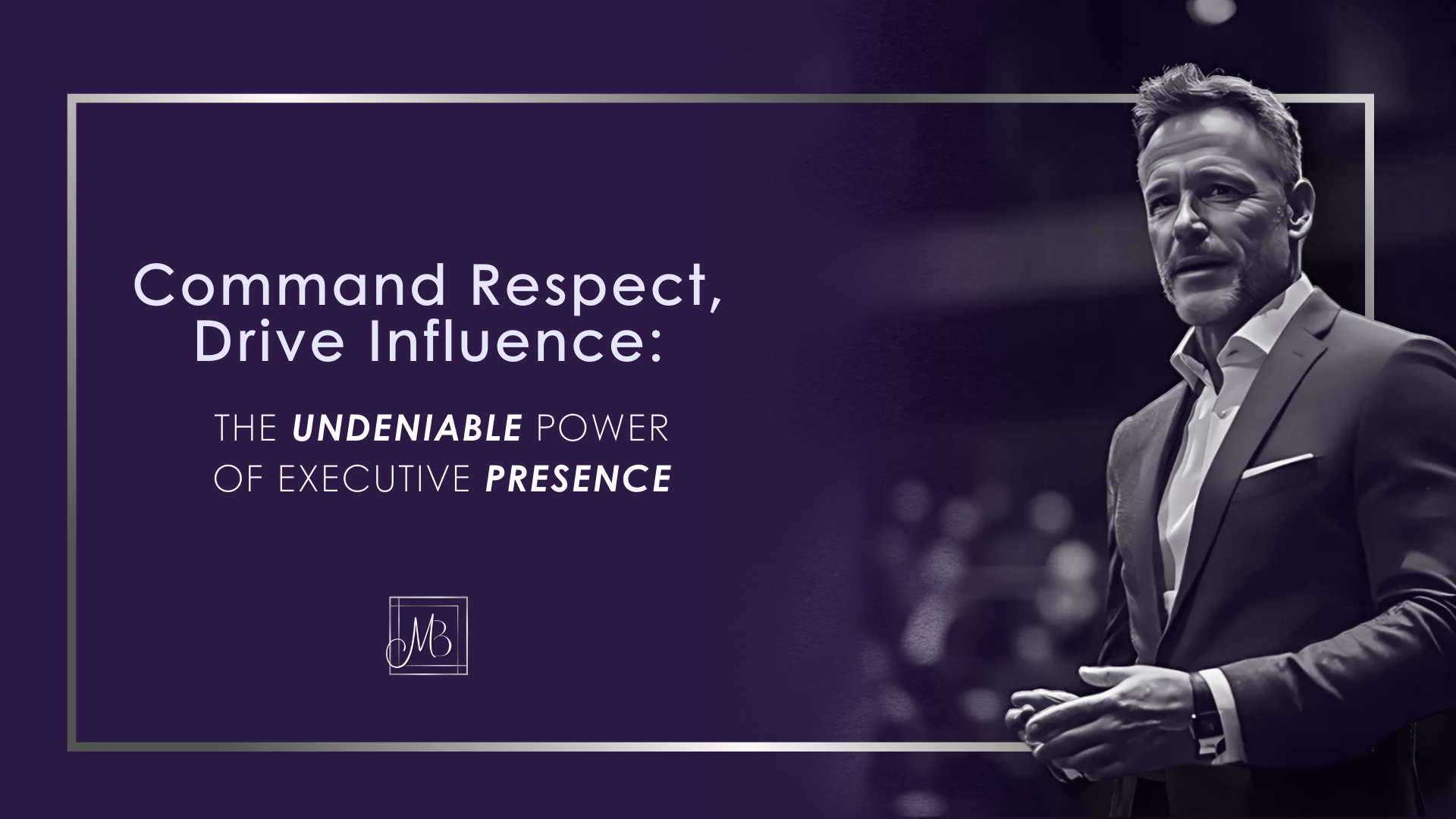Congratulations on your recent promotion or the transition into a new leadership role! Beyond the recent accomplishment, it’s crucial to understand that your emotional intelligence will significantly influence your success. This often-overlooked aspect of leadership is what will truly set you apart and drive your executive impact.
The Power of First Impressions: Leveraging Emotional Intelligence
Your initial interactions and first impressions are crucial in setting the tone for your leadership tenure. While executive presence is essential, practicing emotional intelligence from the outset can elevate your impact and effectiveness as a leader. By tuning into your emotions, understanding the perspectives of others, and navigating interpersonal dynamics with grace and empathy, you can establish yourself as a trusted and influential figure from day one.
Embracing Leadership Evolution: The Art of Self-Reflection
Transition signifies a significant evolution in your leadership journey. Amidst the whirlwind of change, it’s crucial to pause and embrace the practice of positive self-talk and intentional self-reflection. Before entering high-stakes meetings or stepping into leading a new team, take a beat to center yourself, acknowledge any negative thoughts, and consciously cultivate a mindset of confidence, resilience, and self-assurance. Have a formula that works for you to stay true to yourself. Remember, your unconscious mind absorbs the messages you feed it, so choose positivity and empowerment to set the stage for success. Here is where I have had clients stop the executive coaching process only to reengage me after their 90-day grace period or after the big meeting. Consider having a cheerleader in your corner to prep for these transition points ahead of time.
Strategies for Improving Emotional Intelligence
Transitioning into a new leadership role requires a heightened level of emotional intelligence. One effective strategy for enhancing emotional intelligence is practicing mindfulness and self-awareness techniques. This involves regularly checking in with yourself to identify and understand your emotions, reactions, and triggers. Moreover, actively seeking feedback from colleagues and team members can offer valuable insights into how your behavior impacts others, allowing you to adjust and adapt your approach accordingly. Cultivating empathy by actively listening to others, considering their perspectives, and demonstrating genuine care and understanding can further strengthen your emotional intelligence skills.
Navigating New Terrain: The Role of Executive Coaching
As you acclimate to unfamiliar terrain and navigate complex organizational dynamics, the support of an executive coach can be invaluable. An experienced executive coach can provide personalized guidance, feedback, and strategies to enhance emotional intelligence, executive presence, and leadership effectiveness. You can accelerate your professional growth and impact in your new role through targeted coaching sessions, gain valuable insights, and refine your skills.
The Role of an Executive Coach in Navigating New Terrain and Boardroom Dynamics
Navigating the complexities of a new leadership role and the boardroom dynamics can be daunting. An executive coach is a trusted guide and sounding board, offering personalized support and strategies tailored to your unique needs and challenges. Through targeted executive coaching sessions, an executive coach can help you navigate unfamiliar terrain, identify blind spots, and develop actionable plans for success. Additionally, an executive coach can provide invaluable insights and advice on effectively navigating boardroom dynamics, fostering collaboration, and influencing key stakeholders, ensuring that you make a seamless transition into your new leadership role.
Navigating Boardroom Dynamics: The Power of Strategic Listening
Effective communication is paramount in the dynamic landscape of the boardroom or a team meeting. As a leader, mastering the art of strategic listening is essential for fostering collaboration, building rapport, and driving strategic initiatives forward. Rather than solely focusing on conveying your ideas and perspectives, prioritize active engagement with other members participating. Listen attentively, seek to understand diverse viewpoints, and leverage empathy to forge meaningful connections. By cultivating a culture of open dialogue and mutual respect, you can harness the collective intelligence of the board to achieve transformative outcomes. Do you have enough self-awareness to KNOW if you are practicing strategic listening? Again, here is where your executive coach can help you.
Crafting Your Leadership Narrative: Communicating with Impact
In the fast-paced world of leadership, effective communication is crucial for building relationships, inspiring confidence, and driving strategic alignment. The ability to communicate authentically, confidently, and persuasively can shape perceptions and influence outcomes. By improving your communication skills and utilizing emotional intelligence to connect with stakeholders on a deeper level, you can create a compelling leadership story that comes across as authentic and motivates others to support your vision. Through my work as an executive coach with clients, I have discovered that many of them unconsciously struggle with self-doubt, and I help them build confidence. It often surprises them to learn that they lack confidence, even though they have already achieved significant success.
Common Struggles in Communication and Crafting Leadership Narrative
Communication lies at the heart of effective leadership, yet many leaders face challenges. One common struggle is overcoming self-doubt and imposter syndrome, which can undermine confidence and hinder authentic communication. Additionally, navigating cultural differences and diverse communication styles within teams and organizations can challenge leaders. Crafting a compelling leadership narrative that resonates with authenticity and inspires action requires careful thought and consideration. Leaders must balance showcasing their expertise and vision while remaining relatable and approachable to their audience.
Embracing Growth and Adaptability: The Path to Leadership Excellence
As you embark on this new chapter of your leadership journey, embrace the opportunities for growth, learning, and adaptation. Cultivate a mindset of curiosity, resilience, and continuous improvement, and be open to the guidance and support of an executive coach to accelerate your development and maximize your potential. Leveraging emotional intelligence, executive presence, and effective communication can pave the way for success and leave a lasting impression in your high-stakes meeting or new executive position. I have noticed that mindset has become a popular topic of discussion among many executive coaches. In my work with clients, I have always emphasized the importance of mindset since it serves as the foundation for personal growth and transformation.
Exercising Emotional Mastery: Elevating Executive Presence
Executive presence is not just about projecting confidence; it’s about embodying authenticity, gravitas, and emotional mastery. As you navigate the complexities of boardroom dynamics and executive leadership, cultivate the ability to regulate your emotions effectively. Practice the art of emotional self-regulation before entering high-pressure situations or engaging in crucial conversations. Take a moment to breathe deeply, center yourself, and channel your inner resilience and composure. You can inspire trust, command respect, and elevate your executive presence to new heights by exuding a sense of calm confidence and poise.
Empower your Leadership Journey: Increase Respect through Emotional Intelligence
In pursuing success, one must recognize the symbiotic relationship between executive presence and emotional intelligence. While executive presence lays the foundation for leadership visibility, emotional intelligence catalyzes building trust, fostering collaboration, and ultimately commanding respect.
True success is not just about your achievements or awards but also about your meaningful connections and influence with others. To unlock your full potential as a leader, you can improve your emotional intelligence skills, practice self-reflection, and seek guidance from an executive coach. By doing so, you can navigate the complexities of leadership with confidence and grace. Your journey to becoming a successful leader starts right now.





















